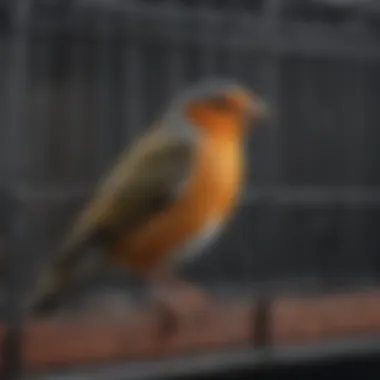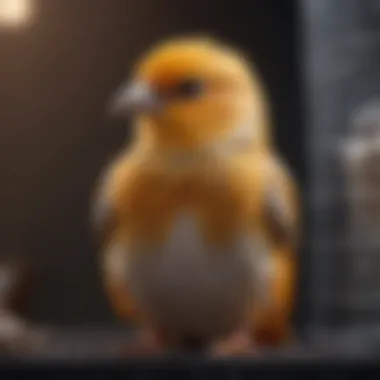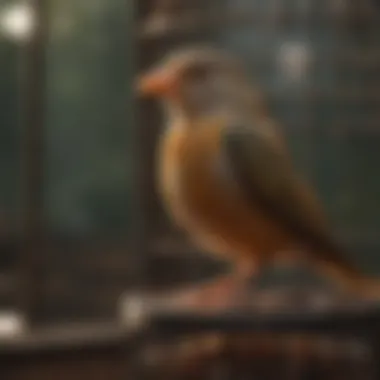Choosing the Best Easy-to-Clean Bird Cage for Your Pets


Intro
Choosing the right bird cage is an essential part of being a responsible pet owner. A suitable cage not only provides safety and comfort for your avian companion but also facilitates straightforward cleaning. Maintaining hygiene is critical for the health of your bird and the cleanliness of your living space. This guide will help you understand the important aspects of selecting a bird cage designed for easy maintenance.
Understanding Your Pet
Birds are diverse in their needs and behaviors. Understanding these elements can greatly assist you in making informed choices regarding their habitat.
Pet Behavior Basics
Birds are social creatures and thrive on interaction. They exhibit a variety of behaviors that can indicate their health and happiness. Pay attention to their vocalizations, movement patterns, and interactions with their environment. A cage that allows for natural behaviors will support their overall well-being.
Common Breed Characteristics
Different bird species have unique requirements. Parakeets, for example, enjoy being in pairs. Canaries, on the other hand, are typically solitary. Knowing the characteristics of your specific breed will guide you in selecting the right cage size and dimensions.
Species-Specific Needs
Consider the species of your bird when selecting a cage. Some birds may require more space for flying, while others prefer a smaller, cozy area. Researching their specific needs will lead to better choices. Remember that a cage designed for canaries may not be suitable for cockatoos.
Pet Care and Maintenance
Maintaining your bird's environment is crucial for their health and happiness. Here are some essential care aspects to consider.
Feeding Guidelines
Feeding a balanced diet is important for your bird's health. Be sure to give them seeds, fresh fruits, and vegetables. Follow specific guidelines according to the species. This will help keep your bird in prime condition, affecting how often the cage needs cleaning.
Grooming Essentials
Regular grooming helps maintain optimal feather condition. Take time to bathe your bird and monitor their nails and beaks. Some breeds may require more frequent grooming, making it important to choose a cage that allows easy access for these tasks.
Hygiene Practices
Establishing a routine for cleaning is vital. Regularly remove droppings and uneaten food. A cage with detachable trays or removable bottoms simplifies this task. Doing so prevents buildup of waste, fostering a healthy living environment for your bird.
Training and Development
Proper training can enhance the bond between you and your bird. This gives them healthier outlets for energy and reduces stress.
Basic Commands and Skills
Teaching your bird basic commands, like
Understanding the Importance of a Clean Bird Cage
Maintaining a clean bird cage is essential for any pet owner. This is not just about aesthetics; it has significant implications for the health and well-being of your avian friends. A clean environment prevents the formation of harmful bacteria and parasites that can thrive in unkempt spaces. Recognizing this importance can enhance the quality of life for your birds and simplify your role as a caretaker.
Health Implications for Birds
A dirty bird cage can lead to serious health issues for birds. Just like humans, birds can become sick from unsanitary living conditions. Feces accumulate can produce harmful pathogens. These pathogens can cause respiratory problems and infections. Moreover, dirty food and water dishes can become breeding grounds for germs. This contamination can lead to digestive issues and other illnesses. To emphasize, a clean environment supports a bird's immune system. It enhances their ability to fight off potential ailments.
Regular cleaning brightens the overall health of your birds. It reduces the risk of disease and ensures a safer habitat. Start thinking about daily cleaning practices that can help maintain your bird's health effectively.
Impact on Overall Well-Being
Beyond health, the cleanliness of a bird cage affects the psychological state of your pet. Birds are sensitive creatures. A dirty cage can lead to stress and anxiety. Unpleasant odors and clutter can make a bird uncomfortable or fearful. Conversely, a clean cage can create a more positive living space. It allows birds to thrive in a safe and inviting environment.


Birds require mental stimulation and social engagement. A clean and organized cage promotes these needs. It enables you to interact more with your pets without distractions. This leads to better bonding and overall happiness for both the bird and the owner.
In summary, understanding the importance of a clean bird cage is multifaceted. It encompasses health considerations and mental well-being. Investing time in cleaning not only protects your birds from illness but also ensures they remain happy and engaged. Every small cleaning effort contributes to a more vibrant and healthier life for your feathered companions.
Key Features of Easy-to-Clean Bird Cages
Choosing an easy-to-clean bird cage is crucial for optimal health and reduced maintenance efforts. This section highlights essential features that contribute to effective cleaning. Understanding these features helps in selecting a cage that simplifies the process and promotes a healthier environment for your bird.
Material Selection
Plastic vs.
Metal
When it comes to bird cages, the choice of material can greatly influence cleaning ease. Plastic cages are lightweight and typically cheaper. They can be easier to wipe down, but they might scratch, harbor bacteria, and can sometimes absorb stains. Metal cages, such as those made from stainless steel, are more durable and less porous, making them a preferred choice for many bird owners. They do not rust easily and are generally easier to sanitize. However, they can be heavier and pricier. Understanding the specific needs of your bird will help determine which material offers the best advantages for your cleaning routine.
Non-toxic Coatings
Cages with non-toxic coatings provide safety against harmful chemicals that might affect your bird's health. Materials like powder-coated metal are popular among many bird owners. They protect the metal beneath and help in reducing wear from cleaning. The coatings are often easy to clean, making maintenance less cumbersome. However, it is essential to check the manufacturer's specifications to ensure the coatings are indeed non-toxic, as some may have harmful sprays. Responsible shopping for a bird cage includes knowing the materials used and their long-term benefits in the cleaning process.
Design Elements
Removable Trays
Removable trays in bird cages are a notable feature that simplifies cleaning significantly. They allow for quick disposal of waste and leftover food. This design element ensures that cleaning becomes more systematic and less time-consuming. A removable tray makes it possible to clean the cage without disturbing the bird, as you only need to slide it in and out. However, make sure that the fit is secure enough to prevent birds from accessing debris or messy areas below. It enhances convenience and reduces the frequency of deep cleaning.
Access Doors
Access doors are vital for easy interaction with the bird, but they also play a role in cleaning. Cages that have wide or multiple access points allow for easier cleaning inside. A large access door makes it easier to remove perches and accessories for washing. Small, awkwardly-placed doors may complicate the maintenance process. Look for cages that prioritize well-placed access options to keep the cleaning process efficient without too much hassle.
Perches and Accessories
Easy-to-Remove Options
Perches designed for easy removal aid significantly in the maintenance of the bird's living space. Being able to detach them quickly allows for thorough cleaning, ensuring hygiene. Many options are available, such as screw-on or clip-on types that facilitate this. However, ensure that the accessories remain stable when attached, so they don’t pose a risk to your bird. Easy removal contributes both to a neat habitat and the overall well-being of the pet.
Washable Materials
Selecting perches and accessories made from washable materials is another factor to consider. Materials like cotton, certain types of wood, and synthetic fabrics can be safe yet easy to wash. Accessories that accumulate dirt should ideally be washable separately from the cage. It reduces the total cleaning time, enhancing the general living conditions of the bird. Having washable options is a practical feature that reflects a thoughtful approach towards the pet's environment and hygiene.
Maintenance Practices for Bird Cages
Maintaining a bird cage involves regular and thorough practices that ensure a clean and healthy environment for avian pets. These practices not only contribute to the hygiene of the cage but also affect the overall health and happiness of the birds. A consistent maintenance routine can prevent the buildup of waste and reduce the risk of disease. It is essential to adopt both daily and weekly cleaning regimes to ensure the welfare of the birds.
Daily Cleaning Routines
Spot Cleaning
Spot cleaning focuses on removing droppings, spilled food, and any debris that accumulates daily. This specific aspect of cleaning is crucial because it directly influences the hygiene level within the cage. The key characteristic of spot cleaning is its immediacy; addressing messes as they occur helps maintain a clean environment. This practice is beneficial because it requires minimal time but achieves significant results in hygiene upkeep. A unique feature of spot cleaning is its adaptability, as it can be done quickly with basic tools like paper towels or wipes. The advantage of this approach is that it prevents the need for more extensive cleaning later, keeping the space pleasant for both the birds and their owners. However, the disadvantage is that it may be neglected if owners are busy, leading to a messier environment.
Food and Water Dishes
Food and water dishes require specialized attention for various reasons. These dishes must be cleaned daily to provide fresh and uncontaminated food and water. The key characteristic of these dishes is functionality; they must be easy to access and clean. This practice not only promotes healthier bird habits but also ensures proper hydration and nutrition. The unique feature of focusing on food and water dishes is their direct connection to the birds’ health. Proper maintenance can prevent mold growth or harmful bacteria, which may arise when these dishes are not adequately cleaned. The advantage is quite clear; clean dishes directly influence the well-being of the birds, as dirty dishes can lead to illness. A disadvantage may be that some materials used in cheap dishes are harder to clean or can warp over time.
Weekly Deep Cleaning
Trays and Walls
Weekly deep cleaning involves a more comprehensive approach, particularly focusing on trays and walls of the cage. The specific aspect here revolves around thorough cleaning to remove any residue that daily spot cleaning may miss. The key characteristic of trays and walls is that they accumulate substantial waste and can harbor bacteria if not properly maintained. Therefore, this practice is popular as it ensures hygiene standards are met. During deep cleaning, trays can often be removed, making for a less complicated cleaning process. An advantage of cleaning trays and walls is that it eliminates potential health risks to the birds. However, it requires more time and effort than daily cleaning, which may deter some owners.


Accessory Maintenance
Accessory maintenance includes cleaning perches, toys, and other items inside the cage. This specific aspect is vital, as accessories often gather dirt or bacteria over time. The key characteristic of accessory maintenance is its integral role in overall cage cleanliness. This practice is beneficial because clean accessories can enhance the birds' living environment and reduce the risk of disease. A unique feature of maintaining accessories is that many are removable and easy to clean with soap and water. The advantage is that well-maintained accessories can provide a healthier and more stimulating environment for the birds. A potential disadvantage is the time involved, as accessories often require individual attention.
Choosing the Right Cleaners
Safe Products for Birds
When choosing cleaners, picking safe products for birds is crucial. This aspect involves understanding the materials and chemicals used in various cleaning products. The key characteristic of safe products is their non-toxic nature, ensuring they do not harm the birds during or after cleaning. This choice is beneficial, as it helps maintain a hygienic environment without compromising the health of the avian pets. A unique feature of these cleaners is that they are specifically formulated for safe use around pets. An advantage of using safe products is the peace of mind they offer to owners. A disadvantage may be that some may be more expensive than standard cleaners.
Avoiding Harsh Chemicals
Avoiding harsh chemicals is essential in creating a safe space for birds. This aspect is vital concerning the risks and consequences harsh chemicals can impose on birds. The key characteristic of this practice is the awareness of toxic ingredients that can lead to health issues for birds. This choice is beneficial as it promotes safe cleaning habits while maintaining the cleanliness of the bird cage. The unique feature in this context is understanding which common cleaning agents are harmful, such as bleach or ammonia. The advantages are clear; by avoiding these chemicals, owners foster a safer home. Conversely, the disadvantage is that some may find it challenging to find adequate substitutes that also offer effective cleaning.
Popular Bird Cage Brands Focused on Easy Cleaning
Choosing the right bird cage is a critical step in ensuring the health and happiness of your avian companion. Popular brands that prioritize easy cleaning play a significat role in reducing the maintenance burden on pet owners. A focus on cleaning simplicity not only enhances convenience but also promotes better hygiene for birds. Brands known for this attribute often utilize innovative designs and materials that align well with best practices for bird care.
Brand One: Features and Benefits
One notable choice in the easy-to-clean category is Prevue Hendryx, a brand renowned for its commitment to pet health and user-friendly designs. Their cages frequently feature removable trays, which simplify the cleaning process. These trays can be swiftly removed, allowing for quick access to clean areas without disturbing the bird's environment unnecessarily. Additionally, Prevue Hendryx employs materials that are durable and non-toxic, ensuring safety while facilitating efficient cleaning.
Key Advantages of Prevue Hendryx:
- User-Friendly Design: Access doors and removable components make it easy to maintain cleanliness.
- Safety First: Non-toxic materials reduce health risks to birds.
- Durability: Long-lasting materials withstand regular cleaning routines.
Brand Two: Features and Benefits
Another prominent brand is Vision, which stands out for its thoughtfully designed cages aimed at reducing mess. Vision cages are designed with integrated waste trays that contain mess and minimize the spread of waste materials throughout the cage. This design limits the need for frequent deep cleaning and regularly helps maintain a cleaner environment for your bird.
Notable Features of Vision:
- Integrated Waste Trays: Effectively captures all waste in a contained area.
- Easy Accessibility: Cleaning is made simpler through well-placed doors and removable elements.
- Simple Maintenance: Lightweight construction assists in quick lifting and handling.
Brand Three: Features and Benefits
Lastly, A&E Cage Company deserves mention for its extensive range of easy-to-clean options. This brand is favored among bird owners who value both aesthetics and functionality. Notably, A&E cages usually incorporate stainless steel, which is resistant to staining and corrosion. This material choice not only ensures durability but also enhances ease of cleaning with simple soap and water.
Highlights of A&E Cage Company:
- Stainless Steel Construction: Excellent long-term value and cleanliness.
- Stylish Designs: Appeals to owners who want a blend of aesthetics and utility.
- Functionally Designed: Most models are equipped with easy-to-remove trays and components.
When selecting a bird cage, consider brands that emphasize easy cleaning as it can significantly improve your bird's living environment and ease your maintenance routines.
Assessing Cost vs.
Quality for Easy-Clean Bird Cages
Choosing the right bird cage involves more than just aesthetics and size. It is crucial to balance cost with quality, especially when ease of cleaning is a priority. The price of bird cages can vary significantly, influenced by materials, design, and brand reputation. Deciding based on cost alone can lead to problems in the future, such as durability issues and increased maintenance. A cage that is easy to clean may initially cost more but can provide long-term savings in terms of maintenance time and cleaning supplies.
Budget Considerations
Establishing a budget is a foundational step in the purchasing process. Assess your financial capacity before exploring options. It is important to distinguish between necessities and optional features. Some aspects might be non-negotiable for functionality, while others can be adjusted for cost savings. Consider the following:
- Material: Higher-quality metals may cost more but last longer, reducing replacement needs.
- Size: Larger cages will typically cost more. However, consider the well-being of your pet; a spacious cage is essential.
- Accessories: Additional items like perches and toys add to the initial expense. Prioritize based on your bird’s species and needs.
“Spending wisely today can lead to savings tomorrow.”
Key Points for Budgeting


- Research Prices: Explore various retailers for price comparisons.
- Evaluate Features: Identify which features are essential.
- Consider Future Expenses: Factor in cleaning supplies and potential future cage upgrades.
Evaluating Long-Term Value
It is essential to assess the long-term value of a bird cage. Often, higher upfront costs lead to greater savings over time. This long view can save not just money, but also time and effort. A cage designed for easy cleaning can spare pet owners from the tedium of frequent deep cleans, which can be costly in terms of both labor and cleaning supplies.
When evaluating long-term value, ask these questions:
- Durability: Will this cage withstand wear and tear over the years?
- Cleaning Efficiency: Does the design facilitate swift cleaning?
- Warranty and Support: Does the manufacturer provide a warranty to cover any defects?
Benefits of Investing in Quality
- Healthier Environment: A cage that is easy to clean helps prevent the buildup of waste, improving the bird’s health.
- Time Savings: Less cleaning effort allows for more time spent interacting with your pet.
- Structural Integrity: A well-made cage is often safer for the bird and more resilient against damage.
By focusing on both cost and quality, pet owners can ensure they choose a bird cage that meets their needs and provides a comfortable lifestyle for their avian companions.
Environmental Considerations
Choosing a bird cage involves more than just selecting a practical design; it also requires attention to environmental impacts. As pet owners become more conscious of their ecological footprint, it's paramount to think about how the materials and practices associated with bird cages influence the planet.
Sustainable Materials
Using sustainable materials in the construction of bird cages is an essential factor. These materials reduce harm to the environment and can offer practical benefits for the bird and the owner.
Benefits of Sustainable Materials:
- Durability: Sustainable materials like bamboo or certain recycled metals often have a longer lifespan, decreasing the need for replacement.
- Safety: Many sustainable options are free of harmful chemicals and toxins, ensuring a safer living space for birds.
- Reduced Waste: By opting for recycled or responsibly sourced materials, pet owners contribute to less waste and a reduction in the strain on natural resources.
For instance, a bird cage made from recycled stainless steel not only stands firm against rust but also minimizes the extraction impact on the environment. Additionally, when selecting options like eco-friendly plastics, always check the certification to ensure it meets safety standards for pets.
Waste Management
Effective waste management is a critical consideration for maintaining bird cages and their surroundings. The disposal and management of waste generated from bird care can adversely affect the environment if not carried out properly.
Best Practices for Waste Management:
- Composting: Bird droppings can be composted, enriching soil when done correctly. This method helps return nutrients to the earth instead of clogging landfills.
- Recycling: Disposing of packaging materials through recycling can minimize waste and its impact on the environment.
- Biodegradable Products: Choosing cages and accessories that use biodegradable materials ensures that when they reach the end of their life cycle, they can decompose naturally without leaving harmful residues.
Important Note: Always research local regulations about waste disposal and follow guidelines to keep the environment safe.
By understanding and applying these environmental considerations, bird owners can contribute to a cleaner planet while ensuring a healthy and happy home for their feathered friends.
Finale: Making an Informed Decision
Choosing an easy-to-clean bird cage is not merely a matter of preference; it is a significant aspect of ensuring your pet bird's well-being. Throughout this article, the various elements that contribute to selecting an appropriate cage have been discussed in detail. Understanding the importance of these factors will empower bird owners to create a healthier, more inviting environment for their feathered companions.
The decision-making process encompasses several factors, including materials, design features, maintenance practices, and environmental considerations. Selecting the right materials, such as non-toxic plastics or metal, is crucial for both durability and safety. Design elements like removable trays and easy-access doors greatly simplify the cleaning process, making it less time-consuming and more efficient.
The ideal cage not only enhances bird comfort but also eases the burden of regular care.
Summarizing Key Points
In summary, the selection of an easy-to-clean bird cage requires careful thought about various aspects:
- Health Implications: A clean cage is vital for the health of your bird, preventing diseases and ensuring a happier life.
- Material Selection: Opt for materials that are safe and easy to clean, leaning towards options like stainless steel or safe plastic.
- Design Elements: Features like removable trays and multiple access doors promote maintenance ease.
- Maintenance Practices: Establish routines for daily spot cleaning and weekly deep cleaning to sustain hygiene.
- Sustainability: Consider eco-friendly materials that contribute to a healthier planet.
These key points serve as a comprehensive checklist for anyone looking to invest in a bird cage that prioritizes ease of cleaning without compromising on quality or design.
Final Thoughts on Cage Selection
Ultimately, the process of selecting a bird cage should reflect a balance between practicality and the needs of your avian friend. An easy-to-clean cage not only makes your tasks as a pet owner less arduous but also offers a more pleasant living environment for your bird. This, in turn, can lead to improved health and vocalization from your pet.
As you consider your options, remember that each bird's needs may differ. Take time to evaluate the unique requirements of your pet, the space you have at home, and how often you can dedicate to maintenance. Making an informed decision will lead to better outcomes for both you and your bird, ensuring a harmonious living space.
In essence, investing a little time and effort into selecting the right cage will pay off in the long run, ensuring that your avian companion thrives in a clean and safe environment.







